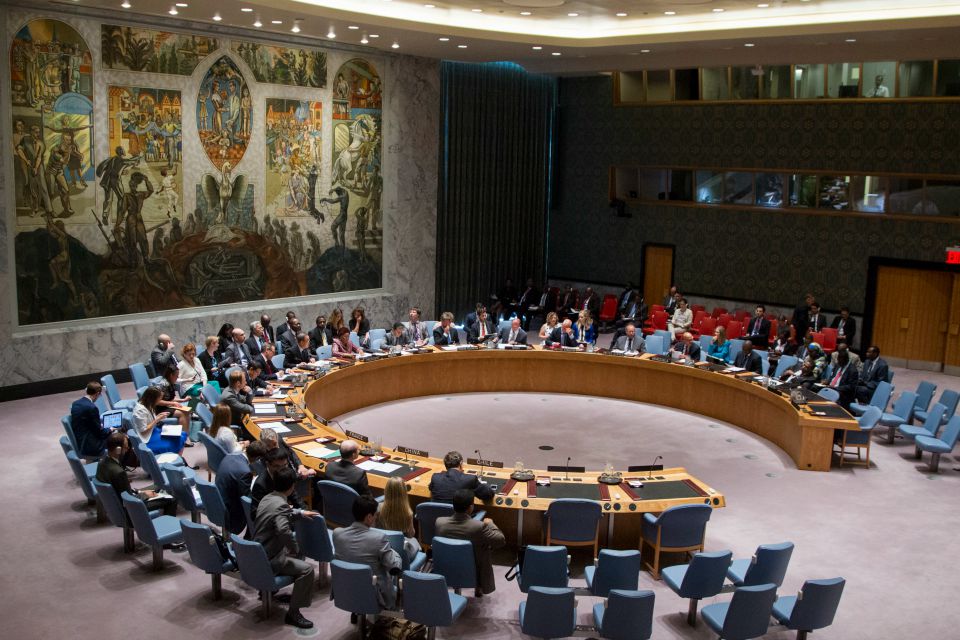"We all bring different approaches to tackling issues of peace and security."
Statement by Ambassador Peter Wilson of the UK Mission to the UN at the UN Security Council Open Debate on Regional Organisations and Contemporary Challenges of Global Security

Thank you Madam President and thank you very much for convening this extremely important debate today. Thank you also Secretary-General for what you have said. You have sent a very clear signal to this Council about how important it is that we cooperate effectively with regional and sub-regional institutions.
That relationship between the UN and regional organisations is one of the greater structural issues for the Security Council. At its best the United Nations and the region work in partnership towards shared objectives, harnessing each other’s expertise, and making a difference to the lives of people across the world. When it works, we are very very strong. When it doesn’t, none of us achieve what we want to achieve. So cooperation is indispensable. The challenges facing this Council cannot be tackled by one body alone; we need the united efforts of international, regional, sub-regional and local bodies.
I think this is most true of all in Africa. This Council has shared objectives and shared challenges on peace and security with the African Union across the continent. These shared challenges make our relationship with the African Union so important. At its best, that relationship makes the lives of some of the world’s most vulnerable people better.
Somalia is a good example of that integrated partnership. The African Union’s military mission – AMISOM – supported by UN logisticians, working alongside a UN Special Political Mission, have been at the heart of progress in Somalia. A joint team from the African Union and United Nations recently made important recommendations on strengthening military and political progress in the country. The Security Council endorsed that work through Resolution 2232 last month. The results of that partnership are clear for us all to see: Somalia is one of the few bright spots on this Council’s agenda.
Bringing an end to fighting in South Sudan is another challenge that we jointly face. We all said that on the 17th of August was a hard deadline for an agreement to bring peace. If the government of South Sudan will not sign up to the IGAD+ deal, then we must all be firm on our next steps. We cannot sit by while leaders fight and their people’s suffering grows.
As a member of the European Union, the United Kingdom is committed to ensuring that Europe plays its part in making the world a safer and more prosperous place. The European Union is engaged across the waterfront of international issues and it’s a key partner for the United Nations in Africa. Its role has also been clear over Iran where it was a clear facilitator of the recent E3 + 3 talks and helped achieve an outcome of which this Council was very supportive and endorsed emphatically.
Madam President,
We all bring different approaches to tackling issues of peace and security. We make the most progress when we harness our comparative advantages as the Secretary-General said. This Council’s ultimate responsibility for the maintenance of peace and security does not exclude the significant talents and perspectives that regional organisations can provide. But it is important for the UN to be engaged at all stages of peace processes where we are required to support and implement them.
The Report of the High-Level Independent Panel on Peace Operations has interesting things to say on this. We agree with the Panel that consultative decision making, a common strategy, and division of labour are key components of the relationship between the Council and regional organisations.
We also agree that partnerships with regional and sub-regional organisations should be part of this Council’s early engagement on emerging threats. Substantive dialogue between the Council and regional organisations is an important tool, and where possible, joint analysis and planning will enable the Council to adopt clearer and better mandates, in particular where regional missions are deployed . We encourage regional organisations to review their own planning, authorisation, human rights monitoring and governance structures, so that together we can create a more coherent international and regional approach to conflict. It is also important for us to work with regional organisations to identify more sustainable ways of funding their operations.
The other partner in this for all of us is civil society, the media and other relevant non-state actors. This year we have heard moving and detailed accounts in Arria format meetings from individuals brave enough to share their experiences in Darfur, in North Korea and in Syria. These briefings improve our understanding of what is at stake. The testimony of those on the ground is central in alerting the international community to escalating tensions. We should continue to examine how we can work more effectively with these groups on the challenges that we face internationally.
The United Kingdom is convinced that we can and should do more to deepen our cooperation with regional organisations across the world. Our responsibility in this Council is to maintain international peace and security. Our ability to discharge this heavy responsibility will only be made stronger by deepening our relationships with regional organisations, which is why we so strongly welcome this important debate today. Thank you.